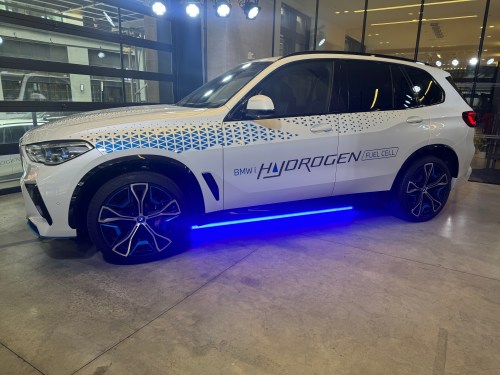BMW Stresses Importance of Both Battery and Hydrogen Electric Vehicles in Achieving Zero-Emissions Future

Despite the growing interest in hydrogen fuel cells as an alternative to battery electric vehicles (BEVs), funding for green hydrogen startups has taken a hit. The industry is facing significant challenges, including high costs and a lack of infrastructure. However, some companies, like BMW, believe that a mix of BEVs and hydrogen vehicles is the key to achieving zero-emissions transportation.
BMW’s Hydrogen Ambition
BMW recently announced plans to work with Toyota to develop a hydrogen fuel-cell consumer car for series production in 2028. The automaker believes that hydrogen vehicles can complement the growing market of BEVs by addressing the needs of customers who cannot or do not want to charge their cars like a phone.
Juergen Guldner, general project manager of BMW’s hydrogen technology and vehicle projects, told TechCrunch that he thinks hydrogen vehicles offer a "best of both worlds" scenario. "You get the benefits of electric driving with the convenience of refueling like traditional gasoline cars," he said.
Guldner emphasized that offering choice is essential for changing people’s behavior. "If you want to change the behavior of people, then offering choice is always the better way forward, versus just taking something away and saying, ‘This is the solution. You’ve got to live with it from now on,’".
A Mix of BEVs and Hydrogen Vehicles
Jason Munster, principal and founder of hydrogen consulting firm CleanEpic, shares BMW’s view that a mix of BEV and hydrogen fuel cell vehicles is more cost-effective and sustainable.
"The thing about battery electric vehicles is that the more you put on the grid, the more the marginal cost goes up," Munster said. "Right now in a lot of places, there’s excess grid capacity, so you can add fast chargers to the grid."
However, Munster also highlighted the challenges facing the industry, including the high costs of building out hydrogen infrastructure and the need for renewable energy sources.
The Challenges Facing Hydrogen
There are several reasons why hydrogen has not yet taken off as a viable alternative to BEVs. One major challenge is the cost of building out hydrogen infrastructure, which is significantly higher than that of electric charging stations.
Another challenge is the lack of standardization in the industry. There is currently no universal standard for hydrogen refueling, making it difficult for companies to invest in infrastructure.
Finally, there is the issue of scaling up production of hydrogen fuel cells. While the technology has made significant progress in recent years, it still lags behind battery electric vehicles in terms of cost and efficiency.
The Impact of Funding on Hydrogen Startups
Despite the challenges facing the industry, some startups are continuing to work on developing hydrogen fuel cell technologies. However, funding for these companies is drying up due to the lack of investor confidence in the industry’s future.
Rebecca Bellan, a senior reporter at TechCrunch, notes that "everyone is really paused around their expansion plans based upon how big this subsidy ends up being." The uncertainty surrounding government subsidies and regulations has left many startups struggling to secure funding.
Conclusion
While the challenges facing hydrogen are significant, some companies believe that it still offers a viable alternative to BEVs. A mix of both technologies may be the key to achieving zero-emissions transportation. However, for this to happen, investment in infrastructure and technology is needed. Without this investment, the industry will continue to struggle.
Relevant Stories
- Researchers Open Source Sky-T1, a ‘Reasoning’ AI Model That Can Be Trained for Less Than $450: Researchers have open-sourced Sky-T1, a reasoning AI model that can be trained for less than $450.
- India’s Digital Payments Strategy Is Cutting Out Visa and Mastercard: India is moving towards reducing its reliance on international payment systems like Visa and Mastercard.
Stay Up to Date
Subscribe to TechCrunch Daily News for the latest news in the tech industry.